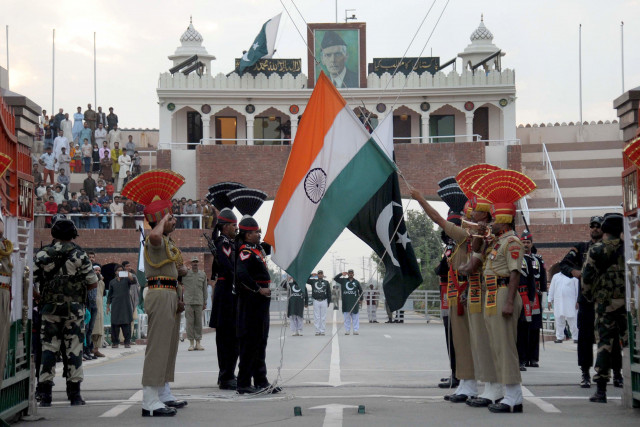Indo-Pak conundrum — is there a way out?
One way out is the step-by-step way, the Simla Accord way, to which India would surely agree readily

Except for the Agra Summit where it showed an inclination to discuss Kashmir threadbare, New Delhi has never shown willingness, even to consider Kashmir as a problem needing bilateral negotiations. PHOTO: AFP
Earlier, in February 1999, it was again Mr Vajpayee who achieved the distinction of being the first and so far the only Indian prime minister to pay a state visit to Pakistan, and that too on a bus. It was a historic visit for more than one reason, the most important being Mr Vajpayee’s announcement at Minar-e-Pakistan that India harboured no reservations about Partition and that it had accepted wholeheartedly Pakistan’s right to exist as an independent state.
It would be highly edifying for those who are handling Pakistan’s current India policy to study the physical, political and economic context, and the leadership quality that had existed in the two countries, in the region and internationally, in the 1999-2001 period and what has happened since in the same context and adjust accordingly while trying to meet the distinct peculiarities of Prime Minister Narendra Modi’s India.
Whatever our reservations may be regarding Prime Minister Modi’s ideological bent and attitude with respect to Pakistan, which we can readily observe through his various pronouncements on our country ever since he came to power, that should not hold us back from assessing in Pakistan’s own supreme self-interest how long we can bear the escalating cost of confrontation with India in economic, social and political terms. Except for the Agra Summit where it showed an inclination to discuss Kashmir threadbare, New Delhi has never shown, all through these nearly 67 years, a willingness even to consider Kashmir as a problem needing bilateral negotiations for its resolution. It has, however, on a number of occasions indicated that it would like to cement the LoC into a permanent border between the two countries. This is not acceptable to Pakistan. But perpetual confrontation with India also does not suit us. The relevant resolutions of the United Nations meant to resolve the dispute have failed to break the logjam that has come to define bilateral relations between the neighbours.
India has never shown any enthusiasm for a composite dialogue proposal as well. And the various full-fledged and half-hearted frontal wars, and an almost 10-year long low-intensity, but bloody skirmish inside Indian-held Kashmir (IHK) during the 1990s, sustained by cross-border infiltration, too, have only rendered the problem even more intractable. If New Delhi is convinced that most of the terror incidents that occur in India and in IHK are the handiwork of elements within Pakistan, then nothing is going to stop it from trying to pay us back in the same coin. So, what do we do under the circumstances? One way out is the step-by-step way, the Simla Accord way, to which India would surely agree readily. Or, we could perhaps wait out India, as Prime Minister Modi, considering himself to be political invulnerable, turns the bilateral dispute into India’s own national problem. We could see the ebbing freedom struggle gaining new momentum, with the urgency in the struggle being provoked by the Indian prime minister’s clandestine attempts to strip IHK off its special status.
Published in The Express Tribune, July 26th, 2015.
Like Opinion & Editorial on Facebook, follow @ETOpEd on Twitter to receive all updates on all our daily pieces.














COMMENTS
Comments are moderated and generally will be posted if they are on-topic and not abusive.
For more information, please see our Comments FAQ